Are you wondering if you can take a walking frame on a plane?
For individuals relying on mobility aids like Zimmer frames or walkers, air travel can raise many questions and concerns. Understanding the rules and accommodations airlines provide for such essential devices is crucial.
From navigating through airport security with your walking aid to understanding airline policies about cabin storage, this guide covers the key aspects you need to know.
So, what are the main points to consider? First, can you take a walking frame through airport security? Second, are there different rules for different walking aids, like folding walkers?
Finally, what are the policies for storing mobility aids in the cabin or checking them in? Let’s embark on a journey to ensure your air travel is smooth and stress-free.
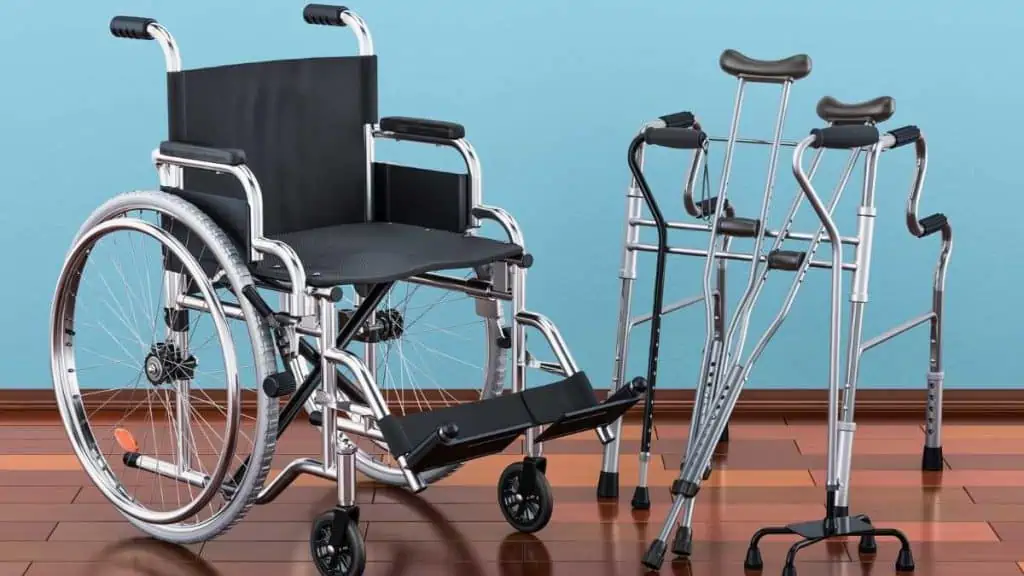
Can you take a walking frame on a plane? You can take a walking frame or Zimmer frame on a plane. They’re allowed through airport security and to the gate. Whether they can be taken on board depends on the airline’s policy, the frame’s size, and available storage space on the aircraft. Folding walkers are easier to store and travel with.
Contents
Can you take a walking frame through airport security
There are no restrictions on taking a Zimmer frame/walker through a security checkpoint at the airport.
However, you may want to consider checking it in at check in as most assistive devices are carried free of charge and then ask for wheelchair assistance.
@AskTSA Service
The TSA offers a very good service on Twitter where you can ask a specific question about whether you can take something through the security checkpoint and they will respond quickly.
This is an example response to a passenger’s question regarding carrying a Zimmer frame:
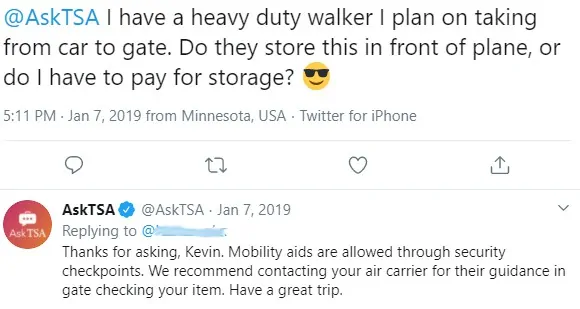
You may consider buying a folding walker, which should make traveling easier. These are some of the most popular available.
Other assistive devices and walking aids
Can you take a walking stick on a plane?
There seems to be some confusion regarding these. Perhaps there is a difference between a walking stick and a walking cane that I am not aware of, or it seems it could depend on whether you need one as a mobility aid to be able to walk or just like to have one with you (perhaps for hiking).
See the following two replies from AskTSA:
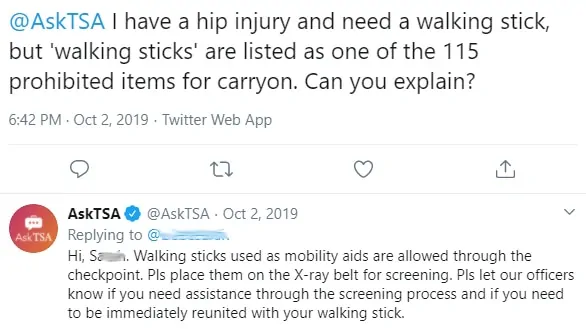
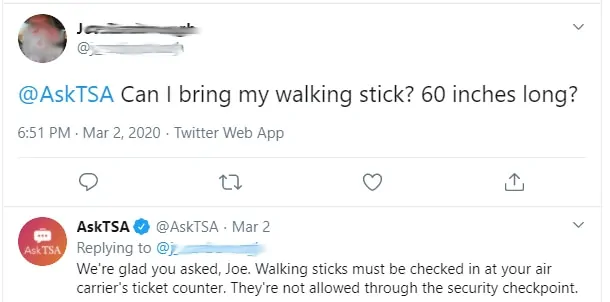
With the reply above it is not just that it is 5 feet long, as you can see from this reply below:
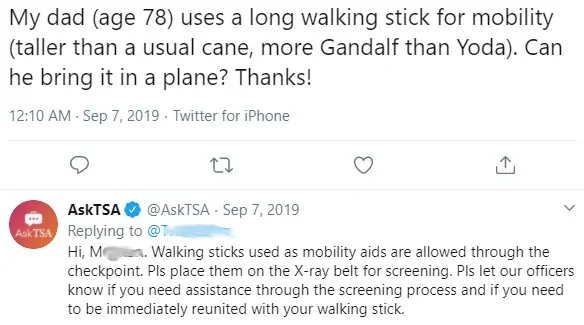
So both normal and folding walking sticks must be packed in checked bags and cannot be taken through airport security and onto a plane UNLESS you require it to walk with.
Wheelchair
A manual wheelchair and its accessories (such as a transfer board) are allowed through airport security. If there is no room for your wheelchair in your airline’s cabin, it will be taken at the boarding gate and checked by the gate agent and put into the aircraft’s hold.
It would then be taken out of the hold by the gate agent at your final destination and should be just outside the aircraft’s door when you disembark, along with children’s strollers etc.
I suggest you contact your airline before flying to find out their policy.
Wheelchairs do seem to cause problems at security checkpoints. It seems as if there are many complaints from people on the AskTSA Twitter page regarding their treatment when using a wheelchair.
Electric wheelchairs and mobility scooters
You can take these mobility devices through the security checkpoint, but you are unlikely to be able to take them into the cabin with you as there would be nowhere to store them.
There could be an issue with battery-powered wheelchairs due to their lithium batteries, as the Federal Aviation Administration has strict rules on flying with lithium batteries.
Contact your airline to find out their policy.
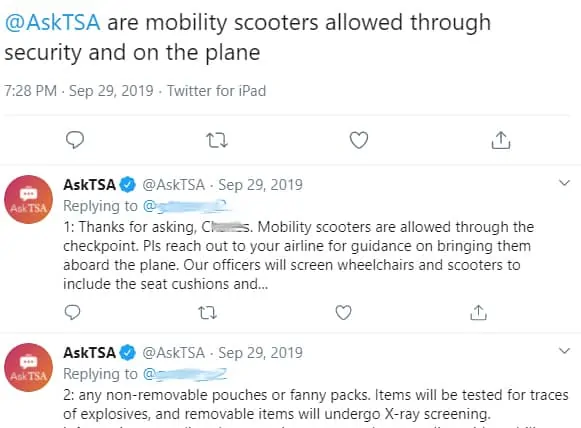
TSA video advice
Can you take a walking frame on board?
One thing that many people who need to take a wheelchair, zimmer frame, or other mobility aid with them have to go into the hold of is whether they will be charged for this. In almost all cases, it will be carried out free of charge.
The US Department of Transportation advice on taking wheelchairs and other mobility aids on a plane – Wheelchairs and Other Assistive Devices
A few airline’s policies on taking mobility devices on board with you:
- American Airlines – Mobility and medical devices don’t count toward carry-on limits. If space is limited, the device doesn’t fit in the cabin or it isn’t required during the flight, it may need to be checked. These include canes and walkers that can be collapsed to fit into overhead and under-seat storage. American Airlines Traveling with mobility and medical devices
- Delta – The onboard stowage space is available for the first collapsible wheelchair that will fit in this space. This space is available on a first-come-first-serve basis. Delta Mobility Aids
- Southwest – If assistive devices cannot be stored safely in the cabin, we will transport it in the cargo compartment [free of charge]. The Customer can retrieve the checked assistive devices at the gate or baggage claim upon arrival at his or her destination. Southwest Wheelchairs & other assistive devices
- Virgin Atlantic – You can usually take a mobility device into the cabin, including a zimmer frame. Occasionally, where there is nowhere to store them in the cabin, the crew will need to place them in the hold. If this happens on your flight, the crew will help you get to the cabin as needed. Virgin Atlantic mobility aids.
- Qantas – On international flights in wide-bodied aircraft, there is a restriction on mobility aids and wheelchairs, which must be no larger than 150cm wide x 160cm high x 150cm long – Qantas mobility aid size restrictions
Conclusion
You should have no problems taking a Zimmer frame or walker when traveling. Just make sure you contact them. Have a good and stress-free flight.
You can find additional information on the National Council for Aging website – Mobility-Friendly Travel Guide
The complete guide to passing through airport security quickly
Can you take medication on a plane?
Can you go through airport security with metal implants?
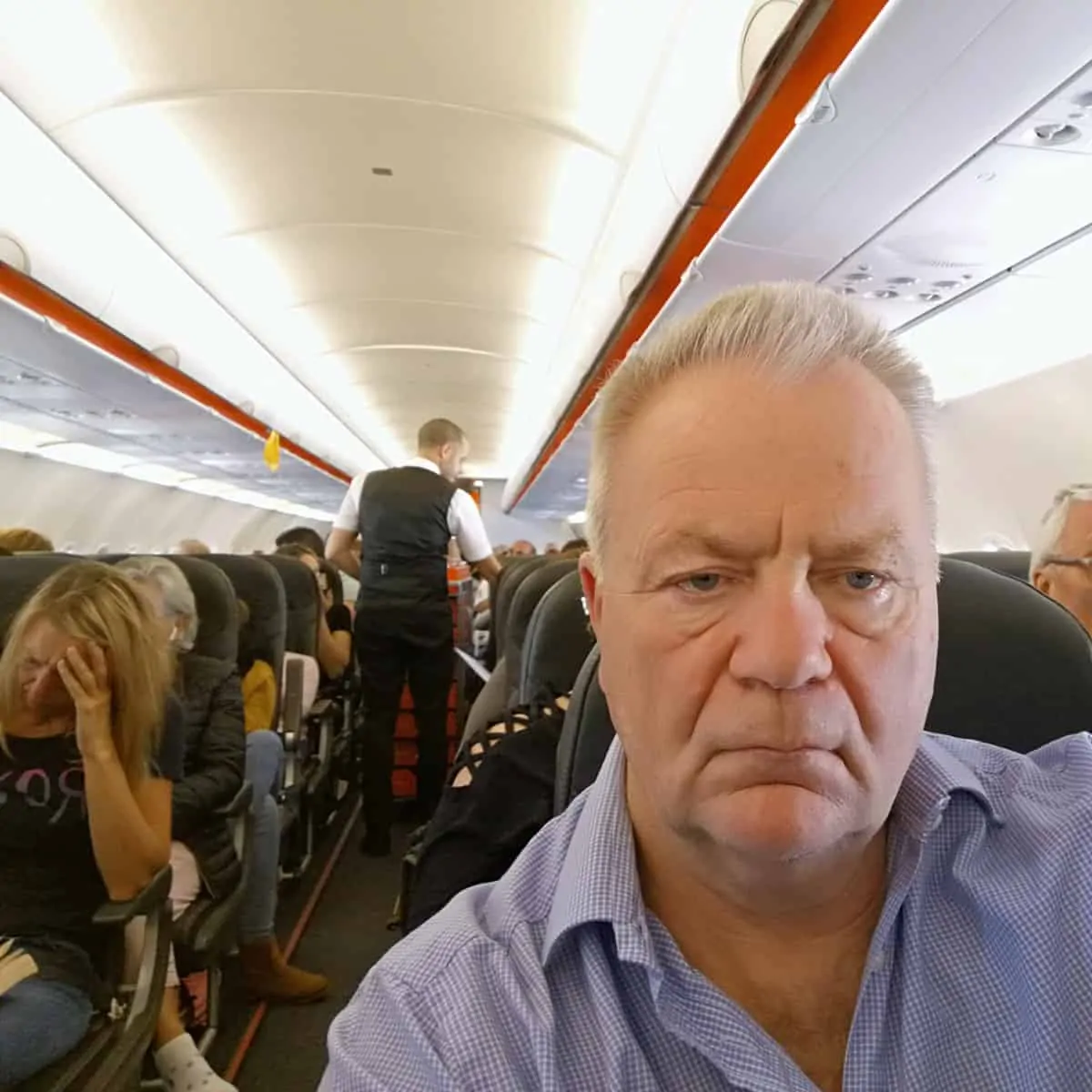
I have been traveling around the world by air since the early 70s and living overseas too. I worked for British Airways for a number of years and I am also a private pilot. About Me


